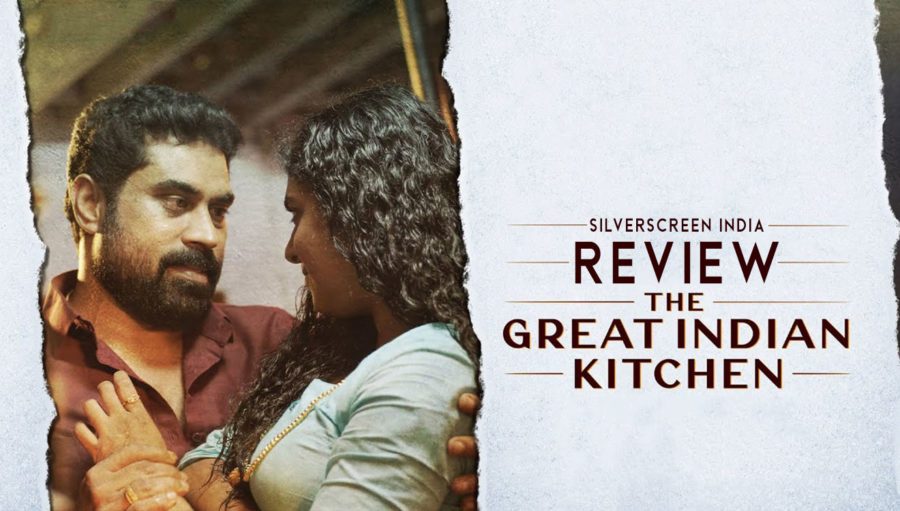Director: Jeo Baby
Cast: Nimisha Sajayan, Suraj Venjarammood
Spoiler Alert
The setting of director Jeo Baby’s The Great Indian Kitchen (TGIK) is an old sprawling Nair mansion in Kozhikode that houses four people- a senior couple, their son and his newly-wed bride. Feudalism is long-dead, but the men in the household continue to flex their muscles by ruling over the women in their environment. The father and the son laze around while the women toil ceaselessly to make the former’s life smooth. The “great Indian kitchen” is, thus, a factory that supplies the fire and steam required to run the man’s world.
Unpaid domestic labour by women isn’t a subject that mainstream cinema has taken a keen interest in, for it is hard to be narrativised. How does one make an appealing film about activities usually attached to femininity, such as cooking and cleaning, and the loneliness that stems from working on these jobs, without the help of devices such as unusual encounters, dramatic turnarounds or many spoken lines?
The 100-minute-long film starts low-key, with a good view of the characters’ milieu. A traditional Hindu wedding, the awkwardness of the initial days of marriage. The film doesn’t specify the names of the lead characters, the newly wed couple (Nimisha Sajayan and Suraj Venjarammood). Devoid of the backing of a definite character history, they represent a majority who are born and raised in a skewed yet popular, traditional family set-up. The production design is fantastic. The household and characters look authentic, straight out of a family photo album.
For over 40 minutes, the film runs without a serious dramatic interference or conversations. You see the details of the tough new life the young wife has to settle into. Fast-cut sequences of her cutting vegetables, cooking, serving and cleaning. Notwithstanding the sense of disjointedness this technique evokes, it helps you to see that the household wearing her down. The woman cannot stop to catch a breath, let alone to reflect on her situation.
Women in Malayalam mainstream films have always disappeared into the kitchen with a glee to produce food for the family. In Akku Akbar’s tacky domestic drama, Veruthe Oru Bharya (2008), a battered wife reconciles with her misogynist husband upon the advice of a marriage counsellor. In the film’s outrageous final scene, the husband walks into the kitchen to compliment the wife who, despite the promise of a new beginning, is still functioning like a machine, and offers to buy her jewellery. The film, like the larger society it exists in, believes domestic labour is exclusively a feminine work.
Jeo’s film is highly political for its insertion of contemporary issues (the Sabarimala dispute and the idea of impurity associated with menstruating women) into a domestic drama and its head-on approach to the question of gender equality within traditional families. Thematically, the film shares a commonality with Adoor Gopalakrishnan’s Elippathayam, where Rajamma (Sharada), an unmarried Nair woman, is condemned to lifelong imprisonment in the kitchen by the patriarchal order.
Here, the new bride (Nimisha) immediately becomes the workhorse of the upper-caste Hindu household. At the end of every day’s grub, she lies on the bed like a log, waiting for her husband to finish his act of loveless sex. Jeo uses repugnance as a fantastic device to underline the physical and psychological trauma she undergoes. A trained dancer, she is barred from pursuing a career as a dance teacher. After she’s practically imprisoned in a six-foot room citing religious norms, the emotional abuse inflicted upon her escalates drastically. She doesn’t respond with patience or love, but rage.
While the film has clarity on the subject, it has glaring structural limitations. TGIK sacrifices story-telling and possibilities of lyricism at the altar of affected realism. The repetitiveness of the scenes of her routine chores, a technique reminiscent of Jeanne Dielman, creates a mixed sense of horror and rage. But the film hammers into the audience the callousness of men by omitting all situations of neutral and more organic interactions between them and the woman. It treats the depletion of love between the couple, an important aspect in the telling of her story in its entirety, offhandedly, and devotes its attention to connecting the kitchen to contemporary political issues. Rather than finding grey shades, the film denounces the characters like an impassioned activist.
And whenever the film cuts from the household to the world outside, to cite examples and draw contrasts, it takes the shape of a viral social media post.
Salu K Thomas’ cinematography is suitably workmanlike, and the performance of Nimisha, Suraj and the rest of the cast are fascinatingly measured. In a filmmaking space that has ignored the kitchen and the normalised oppression of women handling it, TGIK is a right-minded experiment.
Recommended
To call it a brilliant film is to set the bar too low. Jeo wants the viewer to empathise with his characters who are caught in the wheels of obsolete machinery. But what can be more effective in evoking empathy in cinema than a great narrative that runs oh so smooth, a great scene that can move and shake up the viewer! The Great Indian Kitchen, despite its audaciousness that might inspire a plethora of opinion pieces, is a lesser work for its uneven, often flat, filmmaking.
****
The Great Indian Kitchen is streaming on NeeStream.
****
The Great Indian Kitchen review is a Silverscreen original article. It was not paid for or commissioned by anyone associated with the film. Silverscreenindia.com and its writers do not have any commercial relationship with movies that are reviewed on the site.



